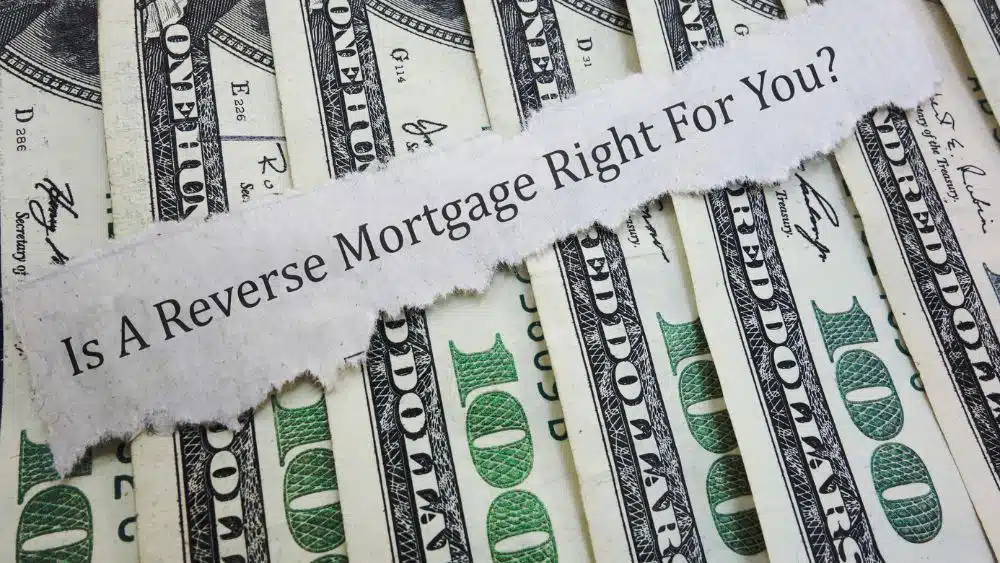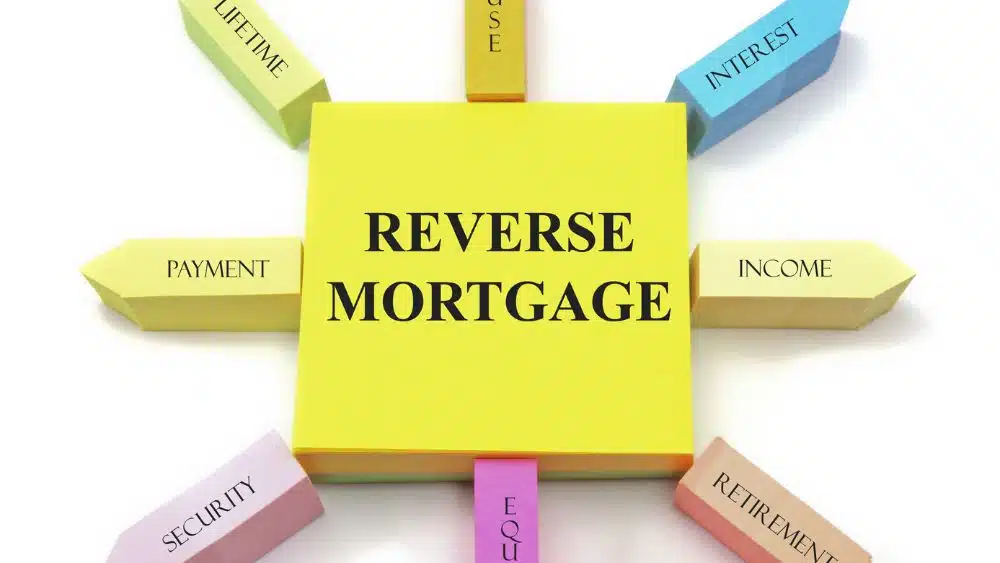
Monthly bills, groceries, medical expenses – for seniors without a steady source of income or a nest egg of savings to rely on, retirement can be a financially difficult time. If you’re a senior with a home paid for in full, you may be considering a reverse mortgage to tap into the home equity you’ve worked hard to build up over the decades.
Reverse mortgages are a type of financing designed specifically for seniors who are 62 and older with a sizeable amount of home equity. Think of it this way, they’re the opposite of a traditional mortgage: instead of making monthly payments to your lender towards your home loan, your lender will pay for a lump sum of cash or monthly payments that’s taken directly from your home equity.
Unlike home equity loans, home equity lines of credit or refinancing your mortgage, you’re free from making any monthly payments towards your reverse mortgage. You’ll repay your reverse mortgage when you move out, sell your property or pass away.
Reverse mortgages are great for cash-poor seniors with their lifetime earnings tied up in bricks and mortar. It’s no wonder in 2021, over 49,200 reverse mortgages were taken out while that number increased to 64,489 in 2022, the National Reverse Mortgage Lenders Association estimates.
But reverse mortgages aren’t for everyone. If you’re considering taking out a reverse mortgage to add some breathing room to your budget, here’s an in-depth look at the pros and cons to help you better understand whether it’s the right option for your financial needs.
Pros of reverse mortgages

2. They provide you with a source of income
The main reason why seniors opt for a reverse mortgage is to receive a source of income to pay for their day-to-day living. If you don’t have cash savings, a retirement nest egg or other sources of income, tapping into your home equity is your best bet.
A reverse mortgage, essentially, turns your asset into a valuable source of income without having to manage another loan repayment.
You can even set up your reverse mortgage to receive funding in a single lump sum, through dedicated monthly payments deposited directly into your bank account, or through a revolving line of credit you can turn to whenever you’re short on cash.
2. They help you stay in your home
While downsizing or moving to a retirement residence are options on the table, if you prefer to stay in your home, a reverse mortgage can help you do that.
In fact, most of the stipulations around a reverse mortgage hinge on you owning the property and using it as your primary residence. For example, to qualify and retain your reverse mortgage, you must own the home outright, it must be kept in great condition (in case your lender needs to resell the property), and you must keep up with homeowners’ insurance premiums and property taxes.
Once you sell the home, move to a retirement home, or transfer the title into someone else’s name, you must repay the entirety of the reverse mortgage.
If you see yourself growing old in the property while paying for bills and typical expenses, a reverse mortgage is the way to do so.
3. They help you pay off your existing home loan, making you mortgage-free
Did you know you can use the proceeds of your reverse mortgage to pay off the remainder of your home loan?
Reverse mortgages come with a lengthy list of costs, but you won’t have to pay a penny upfront because your loan will cover these expenses, including the rest of your mortgage balance. That’s the catch, though: these costs will decrease the total amount of home equity available to you.
4. They can pay for repairs or medical expenses
You should only apply for a reverse mortgage for a just cause, such as groceries, bills and daily expenses. But you can also tap into your home equity for immediate and pressing financial needs, such as paying off other debts, medical expenses or for home renovations, according to the National Council on Aging.
You could, for example, choose to add renovations to your home to help you age-in-place. These kinds of upgrades are costly, but your reverse mortgage should comfortably foot the bill, helping you retire comfortably in your own home.
You should not be using a reverse mortgage to pay for items, such as vacations or miscellaneous spending.
5. They don’t come with tax liability
Another major perk of reverse mortgages is that they are factor in as a loan advance and aren’t considered income, according to the Internal Revenue Service (IRS). This means that you won’t owe any income tax on the cash you receive from your reverse mortgage. This also sets it apart from other retirement income like a 401(k) or IRA.
6. They protect you in case your balance exceeds your home’s value
There’s a great caveat in the setup of reverse mortgages that protect you – and your heirs – if the total amount owed on your loan exceeds the total value of your home at resale time.
While lenders try to ensure you don’t tap into the entirety of your home equity, saving cash for closing cost expenses, accruing interest and other charges, in some cases, the value of your home could be less than your balance owed. This can happen if home prices fall, for example.
If this occurs, however, you and your heirs won’t have to pay the difference. The remaining balance after your home sells for the appraised market value will be covered by the mortgage insurance you’ve also paid for, according to the Consumer Financial Protection Bureau.
Cons of reverse mortgages

They’re expensive
From loan origination fees to closing costs and insurance premiums, you’ll find that setting up and maintaining reverse mortgage is a costly endeavor. This is not a cheap way to borrow money, even if you’re using your own home equity.
These expenses don’t even include the accruing interest and monthly servicing fees you’re on the hook for.
Lenders can charge you the greater of $2,500 or 2 percent of the first $200,000 of your home’s value plus 1 percent of the amount over $200,000 on loan origination fees alone, according to the U.S. Department of Housing and Urban Development. They’re capped at $6,000, which is still a hefty sum.
You can roll all of these costs into your reverse mortgage loan, but they’ll take away from your home equity significantly.
2. They leave your heirs with less financial help
If you wanted to leave your spouse, children and grandchildren a nest egg to help them with their finances, you may leave your family members with less money after your reverse mortgage is paid off.
Remember, while you won’t have to pay a penny of your reverse mortgage back until you pass away, move or sell your home, all of these accumulating expenses need to be paid off.
You – or your heirs – must repay the full loan balance or 95 percent of the home’s appraised value, whichever is less.
Be careful about how much home equity you’re tapping into, especially if you want to leave some to your heirs.
3. They put you at risk of foreclosure
To qualify and retain your reverse mortgage, you must jump through a series of hoops to show lenders you’re a reliable borrower. This includes being able to afford your annual property taxes, homeowners’ insurance, HOA fees and any other recurring costs, such as your mortgage insurance premiums.
If you end up delinquent on any of these expenses or don’t meet these requirements, you could default on your reverse mortgage and lose your property to foreclosure.
With the roof over your head in question, these are really high stakes. You must make sure you’re fiscally responsible and organized with your bills.
4. They could affect your other retirement benefits
Before proceeding with a reverse mortgage application, homeowners must complete an HUD-approved 90-minute financial counseling session. The course is tailored to help you understand what you’re committing to with a reverse mortgage, including the implications this kind of loan may have on your overall finances.
It could affect whether you qualify for other needs-based government funding programs, such as Medicaid or Supplemental Security Income. You must triple check if you need federal help, what you qualify for, and if a reverse mortgage could tamper with this kind of financial assistance.
About 41 percent of homeowners who complete their counseling go on to apply for a reverse mortgage, according to federal government stats. This may be a downside dissuading seniors from moving ahead with a reverse mortgage application.
5. They’re hard to qualify for
The eligibility criteria for a reverse mortgage is limiting. For starters, you must be 62 years old, at least, with at least 50 percent home equity, no federal debt, plenty of savings, and you must stay in the home as your primary residence.
You could be a snowbird, choosing to spend your winters with children in warmer parts of the U.S., or you could be just under the age threshold, deeming you ineligible for this kind of financing.
Take stock of these factors that may be hindering you from applying for a reverse mortgage. If you jump into a reverse mortgage at 62 years old, for example, you’ll need to keep a tight budget to make sure you don’t run out of funds over the years.
And if you like to travel during your senior years, a reverse mortgage may hold you back from visiting loved ones.
Bottom line
Reverse mortgages are excellent financial tools for seniors with little in their savings accounts and no income to pay for their monthly expenses. You can tap into your home equity without selling your home, you won’t have to repay a penny until you move out, sell your property or pass away, and the income you receive is tax-free.
Those are great benefits, but on the flipside, reverse mortgages are an expensive way to borrow. They also put you in a precarious position because you may end up in foreclosure, and they eat away at the home equity you may want to leave your heirs.
Before applying for a reverse mortgage, consider how this kind of financing could affect you or your family in the long run. Also think about how long you plan on staying in your home, and if other options will better suit your needs. You can also downsize, refinance your mortgage, or even scale back your budget to save cash.
Talk to a financial advisor about whether a reverse mortgages makes sense for you, and make sure you shop around to compare reverse mortgage lenders and their interest rates.

Carmen Chai is an award-winning Canadian journalist who has lived and reported from major cities such as Vancouver, Toronto, London and Paris. For NewHomeSource, Carmen covers a variety of topics, including insurance, mortgages, and more.
 Moving to Augusta? Read Our Relocation Guide
Moving to Augusta? Read Our Relocation Guide